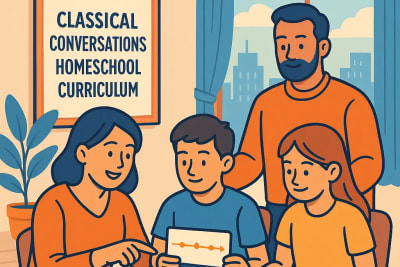Kindergarten Homeschool: Is Kindergarten Optional for Homeschoolers?
Deciding whether to launch a formal kindergarten homeschool program can be both exciting and overwhelming for new homeschooling parents. After all, “Is kindergarten optional for homeschoolers?” is a question that pops up in nearly every forum, especially among families in Florida. In this blog post, we’ll walk you through the legal aspects, benefits, drawbacks, and practical tips of kindergarten homeschool so you can make the best choice for your child’s unique needs. We’ll also provide internal links to our detailed guides and external links to credible sources, ensuring you have all the information necessary to confidently start this educational journey.
1. What Is Kindergarten Homeschool?
When we say kindergarten homeschool, we’re referring to an at-home educational program designed for children around five years old. Unlike traditional public or private schools that may require formal enrollment, many states (including Florida) grant parents the freedom to decide when to officially begin their child’s structured education. This flexibility is what leads many families to question whether kindergarten is truly optional for homeschoolers.
Key Takeaway: Kindergarten homeschool often blends foundational academics—like letters and numbers—with hands-on activities, fostering both cognitive and social-emotional growth in a relaxed, home-based environment.
2. Kindergarten Homeschool in Florida: Understanding the Legal Landscape
Is Kindergarten Optional for Homeschoolers in Florida?
Florida’s compulsory education law starts at age six. This generally means you won’t be legally required to enroll your five-year-old in a formal kindergarten program. However, you may still want to begin some form of instruction at age five to give your child a head start and help them adapt to a learning routine.
- Official Florida Guidelines: For the most up-to-date rules, the Florida Department of Education offers resources on homeschool regulations and record-keeping.
- Record-Keeping: While not mandatory for kindergartners, it’s wise to maintain a basic portfolio of your child’s work, including reading lists and activity logs. This helps you track progress and can be valuable if you continue homeschooling in the long run.
If you’re unsure about the steps to begin, explore our comprehensive guide:
Homeschool Florida: Your Ultimate How-To Guide.
3. The Benefits of Kindergarten Homeschool
Why Starting Kindergarten Homeschool Early Can Be Advantageous
- Customized Learning Pace: Every child learns differently. Kindergarten homeschool lets you adjust lessons—whether your child grasps new concepts immediately or needs a more gradual approach.
- Strengthening Parent-Child Bonds: Spending more time learning side by side fosters a deep emotional connection and encourages open communication.
- Holistic Development: Beyond reading and writing, you can weave in play-based learning, nature walks, and art projects to cater to your child’s creativity and curiosity.
- Scheduling Flexibility: If your family has unique time constraints—like a parent who works unconventional hours—kindergarten homeschool can adapt to your day-to-day life.
Interested in more insights on the broader advantages of homeschooling? Check out:
The Benefits of Homeschooling: A Parent-Friendly Guide.

4. Potential Drawbacks of Kindergarten Homeschool
Balancing Freedom with Structure
- Social Opportunities: Traditional kindergarten naturally offers group activities and friend-making. If you choose kindergarten homeschool, you’ll need to be intentional about social experiences—consider homeschool co-ops, local playgroups, or extracurricular classes.
- Academic Foundations: Kindergarten lays the groundwork for reading, writing, and basic math. Skipping a structured program could mean you need to be more proactive in covering these essentials thoroughly.
- Future Transitions: If you plan to enroll your child in public or private school later, some schools may expect your child to meet specific readiness criteria that are typically introduced in kindergarten.
5. How to Decide If Kindergarten Homeschool Is Right for Your Family
- Evaluate Your Child’s Readiness: Consider their emotional, social, and academic needs. Are they showing an interest in letters and numbers? Do they thrive in more relaxed environments?
- Research State Requirements: Regulations vary by state, and what’s optional in Florida may not be the same elsewhere.
- Assess Your Resources: Teaching a kindergartner at home can be rewarding but also time-consuming. Make sure you have the materials, community, and support you need.
- Consider Deschooling: If your child attended preschool or you’re transitioning from another setting, deschooling can help your child adapt to a new educational environment at home.
- Financial Planning: Some families utilize scholarships like Florida’s Step Up program to offset educational costs. For details, read: How to Get a Step Up Scholarship for Florida Homeschoolers.
6. Practical Tips for a Smooth Kindergarten Homeschool Experience
Making the Most of Your Early Homeschool Years
- Keep It Simple: Focus on foundational skills—alphabet, basic math, and social skills—without overloading your child with rigid schedules or excessive worksheets.
- Integrate Learning Into Daily Life: Turn a trip to the grocery store into a math lesson, or cook together to practice reading recipes and measuring ingredients.
- Embrace Play-Based Activities: Children at this age often learn best through play. Use building blocks for math, role-play for social development, and open-ended crafts for creativity.
- Set Goals and Track Progress: Even simple checklists can help you and your child celebrate milestones, whether that’s recognizing all 26 letters or counting to 20 with ease.
7. Next Steps: Start Your Kindergarten Homeschool Journey
Now that you know kindergarten homeschool is an option—and often quite flexible—you may be ready to take the leap. By blending legal understanding, educational goals, and a bit of creativity, you can craft a homeschooling plan that fosters a love of learning from day one.
Looking for a Structured Online Option?
If you want additional guidance or a more formal academic framework, we offer a range of online classes designed to support families new to homeschooling. Our programs provide flexibility, expert instruction, and a supportive community to ensure your child’s kindergarten homeschool experience is both enriching and enjoyable.
Sign up for our homeschool online class today and take the first step toward a fulfilling educational journey with your child.

Description: In this image, a young child engages with an online course, showcasing
8. Final Thoughts on Kindergarten Homeschool
So, is kindergarten optional for homeschoolers? In many cases—especially in Florida—the answer is yes. Ultimately, the decision rests on what’s best for your family’s schedule, educational philosophy, and your child’s developmental stage. Whether you opt to start formal lessons at five or wait until six, the beauty of homeschooling lies in its adaptability.
For further reading, don’t miss these resources:
- Homeschool Florida: Your Ultimate How-To Guide
- The Benefits of Homeschooling: A Parent-Friendly Guide
- How to Get a Step Up Scholarship for Florida Homeschoolers
- Deschooling in Florida for Homeschool Parents
By staying informed and trusting your instincts, you can create a nurturing and stimulating kindergarten homeschool experience that sets a positive tone for all the years of learning ahead. Enjoy every moment of this exciting journey!



